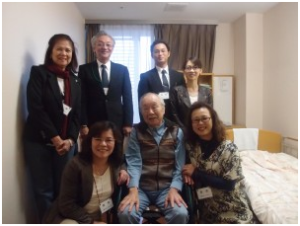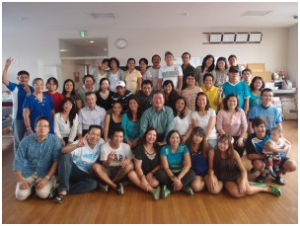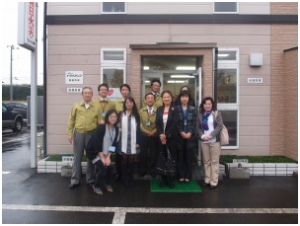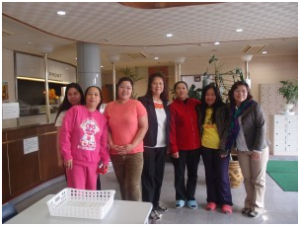“Trip to Japan”By: Ret. Judge Antonina B. Escovilla, PNJK President
As officially agreed in a Board meeting where majority of the members present voted for the business trip of the President of the PNJK INC. Davao City Chapter, President of the Federation of the Nikkei Jin Kai and JPIC Coordinator, Mrs. Ines P. Mallari and yours truly left for Japan on October 18, 2013. Mrs. Eve Obuchi, JPIC Coordinator left ahead of us and met us at the Narita Airport in the evening of October 18, 2013. We checked in at Narita Tobu Hotel.
The following day, October 19, 2013, on board the limousine bus similar to our buses cruising along the national highways in Davao City, but more improved in technology and appearance, the three of us proceeded to Haneda Airport. The usual airport inspection having been completed, we waited for our flight bound for Kagoshima.
At Kagoshima, Mr. Yoshihiro Tokumitsu, President of Enuchicken met us. He brought us to his plant, where we were introduced to several of his assistants. Mrs. Mallari and yours truly toured the processing area. Before entering a particular area we were asked to wear gears similar to the uniform of their factory workers. We passed through the disinfectant area to ensure that we were not brigning in any unwanted virus that may be detrimental to the chickens being processed.
We saw workers inside but could not recognize them as they were covered from head to foot. But what we saw is enough to conclude that the area is meticulously clean and orderly. After conveying to Mr. Tokumitsu the purpose of our visit, that is to encourage the members of our association to organize as a group and the benefit that may derive there from once organized, he promised to support such objective.
After the conference with the officials of Enuchicken we were ushered back to Kagoshima City. This is the city where Mt. Sakurajima spews volcanic ashes almost every day. This has become an attraction to some tourists but a form of disaster on the part of the residents of Kagoshima. Residents of Kagoshima wore masks. Workers in the office used machines to clean their surrounding area. Mrs. Mallari, whose grandparents are from Kagoshima, gathered some ashes as a souvenir to the delight of Mr. Sato, a foreman of Mr. Tokumitsu. We checked in at Urbic Hotel in Kagoshima.
The following day, Sunday, nearly all of the factory workers were gathered in the multipurpose area of the building. We met the Kamiyama sisters, one of whom is still undergoing medication. We saw Remy Taguchi and her husband. We saw Delia with her husband Mr. Suemitsu, as well as the daughter of Teresita Villas and her apo. The newly-married Ritchell to her bucho, including her baby were there. We have not heard any problem from the members. They are happy and content to stay in a peaceful place—a place that is environment-friendly, being surrounded by trees and far from the city. Much to our surprise a program was prepared not only by our descendants but also by the Japanese. Each of us was asked to give a message. Almost everyone wanted us to taste the food prepared by each family. We met the spouses from Manila and the lady whose name I failed to get. She was so impressed by the way we send our members to Japan. According to her our system is so transparent unlike the entity that processed her papaers.
At the end of the day parting was difficult but we still had to continue our journey. We boarded the plane to Tokyo at the Kagoshima airport. Because of my Filipino coins my bag had to be scanned by the machine four times.
In Tokyo, we met Atty. Hideshige Aoki. He invited us to dinner at his residence. After checking in at Kanda Hotel, we were on our way to the residence of Atty. Aoki by train. We were met by Mrs. Junko Aoki and her dog Diana. Mrs. Aoki prepared dinner and we had fun exchanging pleasantries with the couple, as well as discussing the purpose of our visit. Atty. Aoki said that the aim of organizing the Filipino-descendants in Japan is commendable. Cooperation and unity are two criteria that would sustain a viable organization.
The following day, October 22, 2013, we left for Shizuoka via shinkansen. This time we were met by Miles, a representative of ACT, a company headed by Kawagishi Kaicho and his son. We talked lengthily with the father and son who were reluctant in allowing their workers to organize on the basis that they may stage a strike or even engage in illegal activities. Mrs. Mallari explained her position in organizing the descendants. She further conveyed to them that as President of the Federation the organized group will be under her supervision. With rigid supervision and formulation of policies that will be a step further from any irregularities and engagement in illegal activities, she is of the opinion that a strike would never occur. President Kawagishi was convinced with the explanation of Mrs. Mallari. In fact he said their company is in need of more employees, but that they could not give salary increase. While the pay is still within the minimum wage law, giving more is quite difficult.
Both father and son were so gracious enough to invite us to dinner with Vangie who has and is still employed in their company for years and Miles, the over all in charge of some of our descendants.
The following day, we were conducted by Miles to the train station for our trip to Sendai. On October 23, we were met by Hoshi syachou and checked in at the Green Hotel. In the evening, we were gathered at one restaurant by Mr. Hoshi and his son. Thereat, we met the Lumbac family, Esaki family, Emma the granddaughter of Yaiko, Luzminda Morikawa.
In the morning of October 24, 2013, we were fetched by Mr. Hoshi at Green Hotel Kakuda and after bidding goodbye to Mr. Hoshi’s son and his dog, we were on our way to the area where the 2011 tsunami devastated the whole town. Only few people could be seen working along the seaside. The place is so barren that I could only view empty lots with signs of destruction of houses and buildings. Next, we visited the area where the radiation levels were quite alarming. We were not allowed to enter the restricted area. There was one town which had new buildings that had to be abandoned on account of the government warning the residents against occupation as the radiation level would endanger their lives. The wastage of resources was perceptive. Houses that were designed beautifully were empty, without any occupants. Buildings apparently newly built could no longer be used for business purposes. Plants were left to wither. We saw presumably government men manning the area in full gear, attire that would prevent them from inhaling the dangerous gas that may anytime emit from the enclosed radiation plant.
From there, we went to the office of Mr. Hideo Ito. We conversed for a while then Russel Montajes with Mr. Hiroki Komata arrived to take us to Hanzawa syachou. We said goodbye and thanked Mr. Hoshi for his warm hospitality.
We were warmly received in the office of Mr. Masaaki Hanzawa. Greetings posted right beside the door adorned with fresh flowers boosted our depleting energy. The Nakasone family was there – Edna, Mitos and Jam. We were so happy to see them all in good health. We passed by the massage parlor of Mr. Hanzawa and thereat Sheryl Magtulis with her sister Aimee was eagerly waiting for our arrival. Again we saw another signage welcoming the three visitors from Davao. We checked in at Hotel Ookuro Onzen located right within the mountain. Though it was raining we were able to spend a few minutes at the so-called ofro where warm and natural water flow.
October 25, 2013 we visited Triumph Dormitory recently bought by Mr. Hanzawa. In this dormitory a number of our descendants were housed. The mother of April Mae E. Maton, the sister in law of Mr. Felipe Hiquial and relatives of the Kamiyama clan, conveyed to Eve the plan to go back to the Philippines for medical check up. Advices were given regarding the reason behind their presence in Japan. In all meetings conducted to only those who were available, they were informed the purpose of our visit. The sponsors welcomed the proposal to organize among the Filipino-descendants so that with one voice, sentiments relative to their present condition can be aired to appropriate government offices. If the Filipino descendants in Japan truly would group themselves, it could pave the way for the organization to become known. A slot during the Kigyo Kyo Kai Tai could even be allotted to their group if they gain enough recognition.
After our trip in Fukushima where Mr. Hanzawa’s cell-sites are numerous, we proceeded to Mitaka City on October 25, 2013. It was our last stop before going home. At Omiya station, we were met by Mr. Shuji Honda and his better half, Mercy. The couple would have wanted to treat us dinner but because we were so full we acceded to simple snacks. It was kind of the couple to meet us at the train despite the heavy schedule of Mr. Honda. He looks different from his usual attire as an artist. In business suit he can be on equal footing with the kaicho (President in English) that we had met earlier in Kagoshima, Shizuoka, Sendai and Fukushima.
October 26, 2013, at Mitaka City Hotel we were fetched by Yusuke, Mr. Uchida’s grandchild, and his better half. From there we proceeded to the Rehabilitation Center where Mr. Uchida was undergoing medical attention. He looked well, and memory-wise he could still recall our accomplishments in the past such as treating me as his sister, his love for Ines and the growth of the association, the school
being a project cherished by his wife Ayako Sensei.
The trip served as a gauge of how the descendants were treated by their respective “syachou”. Clearly they were comfortable where they stood. They had great accommodations, even better than what they would have had here. Those who want peace and tranquility are in Kagoshima. Expenses there can be keep at a minimum, which would help the descendants save plenty. Saving however isn’t exclusive to those living in Kagoshima. Even if some descendants live in other places, because they live within their means they are still able to save. It is with discipline and curtailment of one’s vices that these people generate a healthy life. Truly, the descendants are lucky. They need not sell any of your property. Their being a descendant is already an asset.




